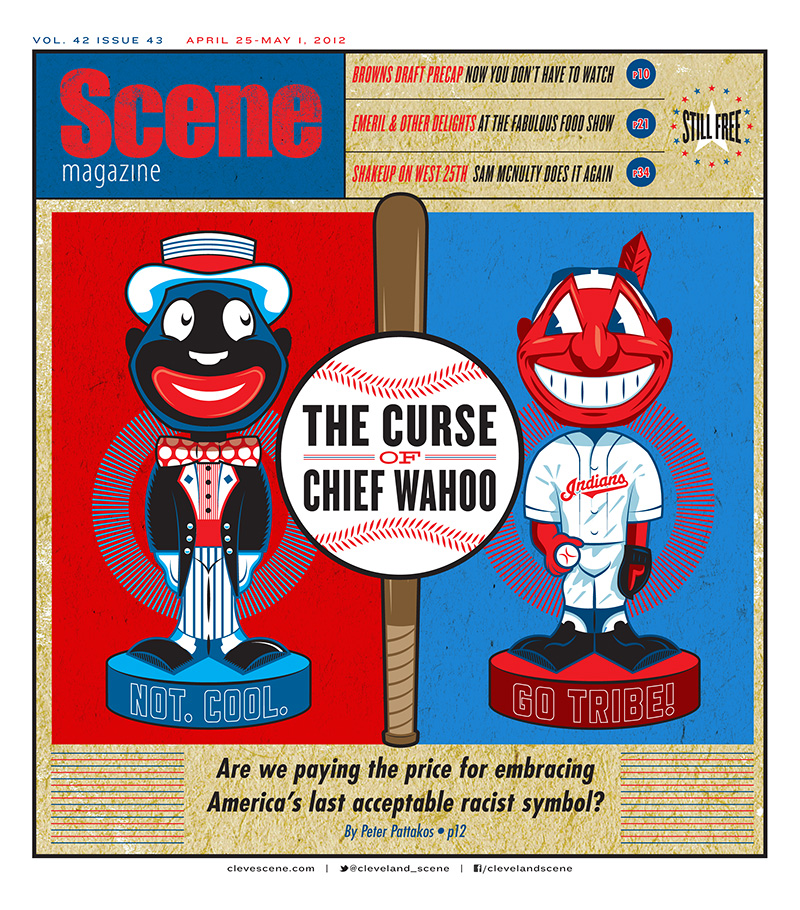It’s some coincidence that The Decision fell on the same weekend as the World Cup final, the most widely-celebrated world championship in sport. To see the Spanish players prostrate in celebration of not just a victory at the highest level but one for their country was the first starkest reminder of what’s sure to be many as to what was lost when LeBron James turned his back on Cleveland last Thursday.
More than affirming just players, teams, coaches, systems or schemes, a World Cup victory affirms a place like no other sporting event can. A World Cup victory sets off a celebration that places are different, that places are important, that it’s important that places be different and that this time, at least in this very real very measurable way, my place was the best. Of course it’s not just that the team is based in the place, but that the players themselves were from and of the place that makes it so.
When LeBron James turned his back on Northeast Ohio, he turned his back on the rarest of opportunities to set off that kind of celebration with a mere NBA title, and in and for the place where such a celebration would have meant more in a real way than it could have meant anywhere else.
For that, we’ve all lost. Not just Clevelanders, Ohioans, or the NBA, but anyone who wants sport to mean more than just athletics, individuals, and schemes. Or at least any of those who think it’s important that places remain places and develop diversely (even Cleveland).
In that sense alone, it can be said that LeBron owed it to everybody to stay home, where it could have never meant more in this way. In that sense, we can see at least a grain of truth in the claims that “Cleveland was totally dependent on LeBron.” In a real way, it was. When had there ever been a chance for one athlete to affirm an American city, a region, so powerfully? It was all teed up so perfectly. So many years of Cleveland being the butt of so many bad jokes, all to be made right thanks to LeBron, who’d restore balance by lifting Cleveland just as the twenty-first century took off. Cleveland: As good as anywhere else, and now, for a time, at least in this real way, thanks to an individual who was born and raised here, Cleveland would be the best.
These feelings would have been legitimate whether or not the balls had bounced just so to land LeBron with the Cavaliers as a rookie by way of the 2003 NBA Draft. No doubt these feelings would have come to the surface had LeBron wound up anywhere else to start his NBA career in pleas for him to exercise whatever control he had to wind up back home as soon as he could. No doubt these feelings are shared not just by Ohioans, but to some degree by sports fans across the globe, as evidenced in part by the visceral global reaction to LeBron’s decision.
And these feelings are only so much stronger thanks to LeBron’s own embrace of his messianic image in Cleveland. King James. The Chosen One. We Are All Witnesses. He’ll take us to the Promised Land. He’ll light Cleveland up like Vegas. It’s a deal that LeBron wasn’t shy about accepting. It’s more than an implied contract that’s been breached here.
If it’s not a betrayal, it’s certainly at least a breach. To say that “LeBron had every right to leave” isn’t to say much, because anyone who makes an agreement “has every right” to go back on the agreement and pay the damages to make it up. However much he might have underestimated it, LeBron knew he’d take on some damage from this breach.
Yet he decided that the damage would be worth the chance to relieve himself of a burden — not just Cleveland’s, but his own — for something that looked like a better deal. Here it’s at least hard to hate if it isn’t hard to judge. We’re talking about a twenty-five year old who’s spent his whole life in Northeast Ohio (as Henry Abbott put it, he’s been “paying the bills for the Cavaliers, in no small way, for years”) going to South Beach to play with not one but two perrenial All-Stars, at least one if not two top-ten talents with whom he’s long been good friends. If LeBron’s primary concern really was that he’d end up “31 years old, with bad knees and no title,” one can at least understand why he’d think that playing with Bosh and Wade for six years would at least keep him from ending up in that place, even if his legacy would end up meaning something less as a result.
Which gets to the saddest part about all of this. Not that LeBron made such an apparently shortsighted decision, but that he might have made that decision out of fear. Not just the decision itself, but the incredibly ugly way it went down makes that conclusion hard to escape. Throughout the entire process, including his last three seasons in Cleveland, LeBron looked like nothing if not a man without guidance. “A sad, lost robot” until the end.
Besides triple-doubles, MVP awards, and second-round playoff appearances, it’s been the only other reported constant during LeBron’s time in Cleveland; nobody could seem to look LeBron in the eye and get through to him with meaningful criticism. The kid went almost immediately from homeless to a nine-figure multi-millionaire with unprecedented power, apparently on nothing but his own talent, practically raised by the game of basketball itself. If nobody close to LeBron could act toward him with more regard for anything bigger than how LeBron himself might react, how could anyone have expected LeBron himself to act in any other way?
Now consider that the one man who might have been in the best position to do that failed; that Dan Gilbert’s already-infamous (disastrous?) reaction to LeBron’s decision reveals more than anything Gilbert’s own failure to deliver the leadership that LeBron seems to have so desperately needed. ESPN’s Chris Broussard has laid out the case:
[Gilbert said he plans] to communicate “events of the recent past” to the public over “the next several days and weeks.
[Gilbert says LeBron] quit in five playoff games over the past two years, yet he was willing to pay him $125 million to stay on his team. . . .
[Gilbert] called James a “self-declared King,” yet failed to mention that it was he himself who promoted the “King James” brand throughout his arena. . . .
[Gilbert] said James has “gotten a free pass” and that “people have covered up for him for way too long,” yet it was Gilbert who overruled the objections of former GM Danny Ferry and gave James and his friends carte blanche throughout the organization. . . .
Then Gilbert said James’ actions Thursday night revealed “who he really is.” . . .
Maybe that’s why James didn’t return Gilbert’s phone calls and e-mails over the past two months — because he knew the owner looked at him as a moneymaker and nothing more. Maybe James no longer wanted to play for someone like that.
Maybe it was an impossible situation for Gilbert with so many hundreds of millions at stake in such an unprecedented way, and maybe no owner would have done any better. But especially in view of Gilbert’s reaction, we have to ask where we might be today had Gilbert been more forthcoming to LeBron about LeBron’s own alleged faults; about all that LeBron “quit” on, and everything else for which LeBron received a “free pass” or was “covered up” over the years. If Gilbert couldn’t speak the truth to LeBron about these things until now out of fear that he might upset LeBron, and his own short-term interests in the process, it’s easier to understand how a pitch to LeBron from Gilbert about the bigger picture would fall on deaf ears. It’s easier to understand why LeBron, maybe especially LeBron, wouldn’t want to spend six more years under that kind of leadership, and easier to understand why Pat Riley or the Arisons (who own the Heat) would come off as more compelling figureheads here, especially with teammates like Wade and Bosh around to help share the burden.
To the extent that the organizational leadership in Miami can succeed where that in Cleveland appears, by its own recent admissions, to have failed, LeBron will find at least some fulfillment in his decision to leave home. If it’s not the Heat leadership, maybe a title will do it; a title that LeBron, Wade and Bosh are good enough to win by themselves. Or maybe a failure to win a title might bring LeBron the stability necessary for him to see just what it was that he passed up on at home.
For now, there’s still every reason to expect that LeBron will one day realize this, and that when he does, he’ll want to come home. Good judgment comes from experience. Experience comes from bad judgment. If there were ever a reason to take less money to help a team come under the cap, LeBron making good on his promise to Cleveland would be it.
Count me as one Clevelander who’d receive the prodigal son with open arms. Here’s hoping Gilbert comes around soon, too.




